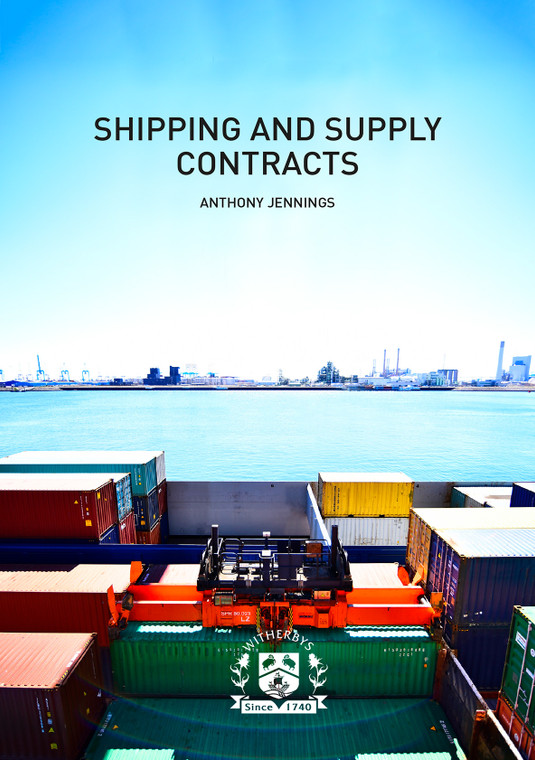
This comprehensive guide, by an industry expert, examines contracts for the transportation of cargoes and the storage, transfer and supply of cargoes at depots and terminals. It also discusses the sale of those cargoes and associated agency and consultancy services.
Most global cargo transportation is done at sea. The transportation and supply of cargo requires numerous contracts with details and terms that vary depending on the product and method of storage and delivery. This publication is an essential guide to the main provisions of shipping and transportation contracts, looking in detail at:
- Legal principles
- common drafting problems
- transportation services and inland transportation agreements
- storage and supply
- other shipping and supply arrangements
- sale contracts
- standard clauses
- preliminary and ancillary agreements
- interface and conflicts, and non-contractual conflicts.
?
As well as providing a detailed guide to maritime shipping and transportation contracts, this all-inclusive guide includes sections on transportation services by rail, road and air and associated documentation.
This book examines contracts for the transportation of cargoes, for the storage, transfer and supply of cargoes at depots and terminals, for the sale of those cargoes, and for associated agency and consultancy services.
The purpose is to examine the legal relationship between a company in the business of transporting or trading cargoes and its service providers, and the obligations it is required to accept, and those it is desirable to impose on the contractor if it can.
Contracts for carriage, storage and delivery of goods involve carriage and delivery by sea, rail, road or air, involving not only the use of marine terminals, but serving the company’s inland commercial or domestic customers via inland storage depots. Bunkering fuels are transported and delivered to terminals by sea, road, rail or pipeline, and redelivered to the customer by transfer at the terminal or by barge from the terminal. The contracts for these services address complex areas of commercial and maritime law, both international and domestic, in often widely differing legal regimes.
By far the most cargo transportation is done by sea. Vessels are adapted for different cargoes. They may be designed for containers, RoRo vessels for wheeled cargoes, reefers for refrigerated ones, dry carriers for timber, bulk carriers for ore, grain or cement, or oil, gas and chemical tankers. Oil products alone range from fuel oils to marine distillates such as diesel oil and gas oil, through to light oils, condensates like propanes and butanes, and lubricants. The transportation and supply of these cargoes require contracts with many features in common, but their terms must vary in detail depending on the product and method of storage and delivery.
Many contracts for transportation and storage are for one-off transactions on the terminal operator’s terms, but many others also need to be tailored to a longer-term relationship with the contractor. Although some trading companies own depots and terminals themselves (ownership often meaning a leasehold or licence interest, since many freeholds in the land on which depots and terminals are situated belong to local or port and harbour authorities), they do not necessarily have offices, or even local staff, in all areas where their terminals are situated, so they may require the services of a contractor to operate them. Even if they have equity terminals around the world, these are rarely situated in every place or port where the company needs a service, thus involving storage, trading or exchange agreements, sometimes of a complex nature, and the use of third party storage may become imperative even at a port where a company owns a terminal. Under the agreement giving access to storage services, simply making storage available, whether dedicated or not, may be inadequate and the contractor may be asked to provide, for example, a redelivery or bunkering service.
There will be projects in which it may be desirable to delegate greater powers to the contractor in the conduct of the business, involving closer relationships on the part of the contractor with both the company and its customer. The contractor may, for example, be appointed as sole or main supplier of the company’s products to its existing customers within a prescribed territory, involving a sale and supply arrangement, under which the contractor may itself provide the product, requiring the contractor to take greater responsibility for customer liaison and service, or there may be an agency arrangement, with the contractor taking orders for, or making deliveries of, the company’s range of products.
A trusted contractor with the right expertise may be appointed the company’s sales agent, with an active brief of developing the market, contacting potential customers and referring them to the company, requiring the company to relinquish more control over its links with customers. The contractor might even be made a full agent, empowered not just to solicit but to execute new business on its principal’s behalf. This involves the grant of considerable authority by the company and has important consequences both in its general impact on the company’s business and in specific respects; for example, it may have tax consequences. These relationships between the company and the contractor mean the application of the law relating to agency and its consequences also need to be understood.
A company trading goods in a particular territory may see an advantage in taking an equity interest in a terminal or product supply project, which might involve either a share or asset acquisition or a joint venture. The legal aspects of share or asset acquisitions and disposals, and consortium agreements also need to be understood.
If the company is asked by one of its contractors to provide a similar service, the fundamental legal considerations may be the same, but it will approach negotiations in the different role of service provider, resulting in the ‘battle of the forms’.
The end purpose of all these agreements for product handling services is simply to facilitate the sale of the company’s products, so the book also discusses sale contracts. The terms of the sale contract need to be looked at in the context of the storage or transportation agreement, as well as any standard terms or rules for carriage of goods under those sale contracts, depending on whether the goods are delivered by sea, land, air or pipeline.
Standard terms such as Incoterms, as developed by the International Chamber of Commerce, and the Hague Rules are comprehensively discussed and described elsewhere, and are not the subject of this book, but the differences between the various types of sale contract, FOB, CIF, etc are explained.
In negotiating longer-term contracts, preliminary arrangements and agreements such as tendering, confidentiality and non-compete agreements are often needed, and these are also discussed.
All these contracts must work as a whole. The terms of a storage contract can easily conflict with those of a sale contract for the same products stored at a terminal. The contract of affreightment may contain terms that conflict with both. These inconsistencies may give rise to unforeseen liabilities and have adverse financial consequences, so the pitfalls need to be understood, and they are discussed in detail.
Contents
Preface
Introduction
?
Chapter 1 General Legal Considerations
1.1 Legal Principles
1.2 Contracting Issues
1.3 Common Drafting Problems
1.4 Type and Format of Contract
1.5 The Battle of the Forms
?
Chapter 2 Transportation Services
2.1 Marine Transportation
2.1.1 Contracts of affreightment
2.1.1.A Discussion
2.1.1.B Detailed analysis of COA
2.1.2 The voyage charterparty
2.1.3 Barging and lightering agreements
2.1.4 Oil industry vessel service contracts
2.2 Inland Transportation Agreements
2.2.1 Road tank wagon contracts
2.2.2 Rail contracts
2.3 Aircraft Services
?
Chapter 3 Storage and Supply
3.1 Depots and Terminals – Key Issues
3.2 Terminal Operator’s Licence
3.3 Dry Bulk Cargo Storage Contracts
3.4 Fuel Storage Contracts
3.4.1 Discussion
3.4.2 Detailed review of typical agreement
3.5 Terminal Operating Agreements
3.5.1 Discussion
3.5.2 Review of typical operating agreement
3.6 Fuel Supply Service Contracts
3.6.1 Discussion
3.6.2 Review of terms
3.7 Commission Agency Agreement
3.7.1 Background
3.7.2 Non-compete considerations
?
Chapter 4 Other Shipping and Supply Arrangements
4.1 Joint Ventures and Acquisitions
4.2 Logistics and Management Services
?
Chapter 5 Sale Contracts
5.1 General
5.2 The Charterparty
5.3 Types of Contract
5.4 Review of a Typical CIF Sale Contract
5.5 Standard and Additional Terms and Spot Terms
5.5.1 Standard terms of sale
5.5.2 Spot terms of sale
5.5.3 Enforceability of standard and spot terms
5.6 Interface
5.6.1 Interface between sale contracts and storage agreements
5.6.2 Interface between sale contracts and terminal regulations
?
Chapter 6 Standard Clauses
6.1 Contract Clauses Common to all Shipping and Supply Contracts
6.2 Boilerplate Clauses
?
Chapter 7 Preliminary and Ancillary Agreements
7.1 Tendering
7.2 Confidentiality Agreements
7.3 Non-Compete Agreements
7.4 Consultancy Agreements
7.4.1 Discussion
7.4.2 Detailed terms
?
Chapter 8 Interface and Conflicts
8.1 Transportation Contracts
8.1.1 Transportation contracts and storage and supply contracts
8.1.2 Transportation contracts and sale contracts
8.1.3 Transportation contracts and terminal regulations
8.2 Storage and Supply Contracts and Terminal Regulations
8.3 Joint Venture Contracts and Terminal Regulations
8.3.1 Interface between joint venture and terminal
8.3.2 Impact of joint venture agreements on third party use of the terminal
8.4 Non-Contractual Conflicts
8.4.1 Vessel detention or arrestment at the terminal
8.4.2 Restraint orders
Witherbys Titles
Witherbys
titles
are
developed
using
scripts
developed
by
technical
experts
that
are
peer
reviewed
within
work
groups.
Typically,
they
seek
to
improve
understanding
of
the
regulations,
recommendations
and
guidelines
issued
by
Industry.
Witherbys staff have significant expertise in the fields of navigation and hazardous cargoes as well as in the presentation of complex subjects in a graphic and easy to understand manner.
- Number of Pages:
- 362
- ISBN:
- 9781856097819
- Binding Format:
- Hardback
- Book Height:
- 240 mm
- Book Width:
- 160 mm
- Weight:
- 1.2 kg
- Author:
Witherbys
- Published Date:
- December 2018
- Preview:
- Yes



